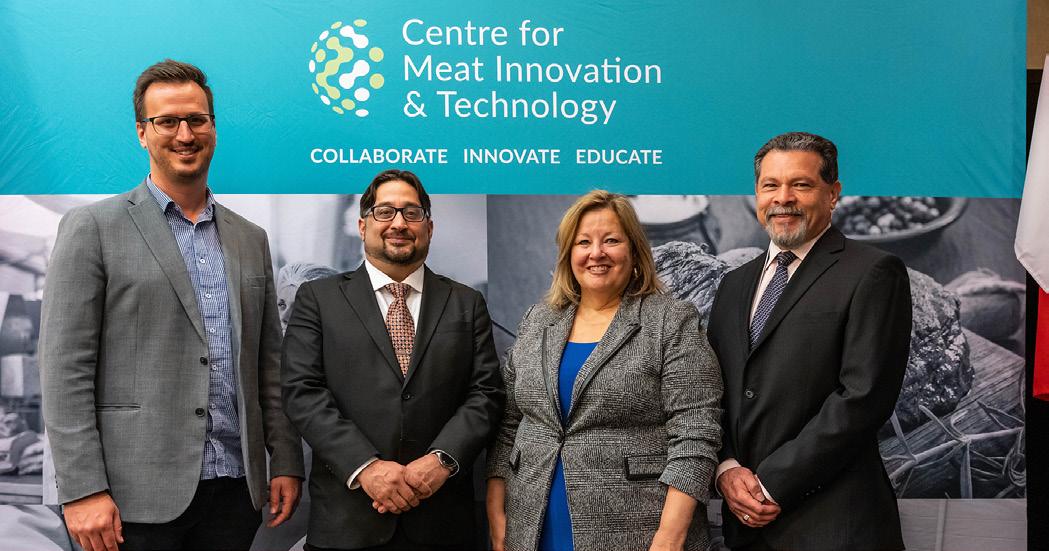
7 minute read
CANADA SECURES GUATEMALA MARKET FOR CANADIAN MEAT PRODUCTS
The Canadian government recently announced that it has regained market access to Guatemala for Canada’s pork, beef and poultry products.
Guatemala had closed access to its market for Canadian meat products in December 2013, due new requirements to inspect facilities in Canada for approval of exports.


Since 2013, the Canadian Food Inspection Agency, with the support of Agriculture and Agri-food Canada, has been negotiating access for Canada’s meat products to Guatemala.
We Communications West Inc.
106-530 Kenaston Boulevard
Winnipeg, MB, Canada R3N 1Z4
Phone: 204.985.9502 Fax: 204.582.9800
Toll Free: 1.800.344.7055
E-mail: publishing@meatbusiness.ca
Website: www.meatbusinesspro.com
Meat Business Pro subscriptions are available for $28.00/year or $46.00/two years and includes the annual Buyers Guide issue.
©2020 We Communications West Inc. All rights reserved.
The contents of this publication may not be reproduced by any means in whole or in part, without prior written consent from the publisher. Printed in Canada. ISSN 1715-6726
“This is a big win for Canada. The success of Canadian agriculture depends heavily on Canada’s ability to export to the world, and Guatemala presents many opportunities for our exporters”, stated Marie-Claude Bibeau, Minister of Agriculture and Agri-Food. “Our government will continue to support industry’s efforts to get Canadian businesses into new and existing markets and stimulate economic growth.”
As part of this market access, Canadian exports of beef, pork and poultry meat products produced on or after April 17, 2023, are now eligible to be exported to Guatemala.
Increased exports into Guatemala has been part of Canada’s long-term strategy to grow international markets for Canadian exporters, while contributing to global food security benefiting global consumers with access to high-quality meat and poultry products.
This also provides more opportunities for Canadian producers to diversify their exports and access key markets that are in close proximity geographically. Given the high transportation costs and supply chain challenges industry has faced, this access is welcome news.
Quick Facts
• In 2022, Guatemala’s total global import of beef, pork, and poultry was valued at $360 million.
• Canada’s agriculture and agri-food exports have continued to increase despite sector challenges, reaching over $93.9 billion in 2022 and surpassing a previous target to grow agri-food exports to at least $75 billion by 2025.
Cmit Dedicated To Advancing And Strengthening The Canadian Meat Processing Sector


The Centre for Meat Innovation and Technology (CMIT) is the only Canadian meat Processing hub bringing together skills development, knowledge, collaboration, technology, innovation and research to make the meat processing industry more successful.

A new Centre for Meat Innovation and Technology (CMIT) was recently launched by Meat and Poultry Ontario to help Canadian processors collaborate, find and adopt new technology and innovation and make it easier for their employees to learn and advance their skills.

“This centre will ultimately help both processors and meat and poultry producers,” says CMIT Director Luis Garcia. We did our research and both processors and farmers told us there was significant room for them to grow if some of the key barriers holding them back could be addressed,” he explains.

One example is that processors have difficulty finding good employees with the specific skills they need. CMIT has been created to help address that gap. Garcia points to micro-credentialing courses already held for sausage making and other in-demand skills, with more being planned.
Another challenge for processors is often finding and testing the latest technology to see if it would be a fit for their operations. By collaborating with experts and manufacturers around the world, CMIT will help processors find and access solutions that will improve their operations and efficiency. The equipment can then be set up and tested through CMIT’s collaboration with the University of Guelph’s federally-inspected meat processing facility.
“The Centre for Meat Innovation and Technology is an example of how our agri-food advocacy groups are highlighting the valuable career opportunities available in Ontario’s agri-food sector,” said Lisa Thompson, Minister of Agriculture, Food and Rural Affairs. “I would like to express my appreciation to the organizations who have donated the new equipment for this facility, and to Meat and Poultry Ontario for making this Centre a welcomed reality.”
“Young people need to see meat processing as a viable career and the best way to do that is through education,” comments Kevin Stemmler, Owner of Stemmler Meats and a strong supporter of CMIT and the organization’s mandate.

Stemmler has a second reason for his support. “During the pandemic we relied too much on a few companies to support our internal food system and we had issues. To protect the food system in the future, we need to be able to rely on more companies so we need to help them with skills and technology. That’s what CMIT will do.”
CMIT has a plan to be self-sustaining within the next five years by building fees for services and is launching a campaign to raise $1,000,000 to cover initial operations costs as revenue streams grow. Initial work and projects are already underway.

CMIT is founded and supported by Meat & Poultry Ontario to advance and strengthen theCanadian meat processing industry. The Centre is the leading Canadian meat hub powering industry collaboration and innovation. CMIT is dedicated to showcasing the world’s leading technology and helping Canadian processors adopt these innovations to become more competitive. CMIT is the only Canadian meat technology hub that encompasses skills development, training and sharing best practices backed by world class research and education.
About Mpo
Meat & Poultry Ontario (MPO) is the representative voice of Ontario’s meat industry. Our members are independent businesses proud to serve the communities they live and work in. The association is comprised of meat and poultry processors, wholesalers, and retailers; industry suppliers; and not-for profit organizations that support MPO’s objectives.
Ontario’s meat and poultry sector employs 25% of Ontario’s food and beverage processing industry — the single largest manufacturing employer in Ontario — and generates $11.2 billion of the province’s $45 billion food and beverage processing industry revenue.
For more information, visit https://www.meatpoultryon.ca

IS KETO BAD FOR THE HEART?
By Nina Teicholz
Recently we saw another spate of anti-keto headlines stemming from an authoritative report, this time from the American Heart Association (AHA), warning that the “keto” (ketogenic) diet is bad for heart health. According to an AHA expert panel, low-carb diets, including keto and paleo, should be ranked last among 10 popular diets assessed. Mediterranean, low-fat, vegan, vegetarian and DASH (Dietary Alternatives to Stop Hypertension) were all rated higher.



But first, let’s look at the science on whether keto might actually be dangerous for heart health. We have no ‘hard’ data, i.e., evidence from clinical trials on heart attacks and deaths, to know the long-term effects of low-carb. Some observational studies have purported to find an association between low-carb and increased mortality, but these papers defined the diet, variously, as having between 37% to 50% of calories as carbohydrate, whereas top researchers in the field use the numbers 25-30%.
This list looked a whole lot like one in January, in U.S. News & World Report’s “Best Diets,” issue, which gave low marks to keto and paleo. And last month, there were another 30-plus keto-bashing headlines, at CNN.com, Forbes, Salon, WebMD, Medscape and other outlets, with altogether millions of social-media views, trumpeting a study presented at a conference of the American College of Cardiology (ACC), which purported to show that a “keto” or “keto-like” diet was associated with elevated LDL-cholesterol (the so-called “bad” one) and a higher risk of cardiovascular events.
Is it possible we’re seeing a campaign of weak science being corralled to scare people away from the ketogenic diet? Upon inspection, it turns out that the science behind these claims is not just flimsy, it’s non-existent. In the case of the ACC reports, for instance, there’s not even a preprint of the study to justify the dozens of headlines.
Since we don’t have “hard data” on death or heart attacks, we can only look at the next-best thing: recognized cardiovascular risk factors such as cholesterol, which might predict longer-term outcomes. Here, we find multiple clinical trials showing that a ketogenic approach resolves high blood pressure (often within weeks) and improves most heart-disease markers. In a sizable trial after 1 year, a ketogenic approach improved 23 of 26 heart-disease risk factors measured, with the overall cardiovascular risk score dropping by nearly 12%, according to the ACC’s own “ASCVD risk calculator.” Of course more research is needed, but according to these data, a ketogenic approach seems safe and indeed, promising for combatting heart disease.

Given these data, how should we think about the allegations against keto? I already wrote about the scant science behind the U.S. News’ “Best Diets” list. Four of its highly ranked diets hadn’t even been tested in a single clinical trial.
The AHA and ACC, however, are more prominent authorities. These groups may have been heavily funded by pharmaceutical companies, yet they still command respect among doctors, and their guidelines are widely followed. And if they have solid science on the dangers of keto, then we should be grateful that such authorities are issuing caution. So let’s take a look.
The Aha Report
Headlines such as “Popular keto and paleo diets aren’t helping your heart” in the Washington Post give the impression that the AHA authors looked at heart-disease outcomes of these diets in some systematic way, but in fact, they did not. Instead, the aim of the paper was to examine how closely each diet aligned with the AHA’s own diet plan. The authors asked, essentially: Are you like us? By this standard, the #1 diet on their list is DASH, because…that’s the AHA’s own diet! The AHA report was a self-affirmation exercise, a purity test. Headlines should have read: the AHA likes its own diet best and disapproves of others.
Although a rigorous analysis of any diet was outside the scope of the paper, the AHA authors nevertheless took the opportunity to lob some time-worn, long-since disproven pot shots at keto. The lead author, an established vegan advocate (also a panelist for U.S. News’ “Best Diets”) warns about the “keto flu,” a complaint dating back some 25 years that’s been answered in too many books and articles to count (in short, this “flu” is a transient condition that can easily be avoided by drinking soup broth). The authors also criticize the lack of a saturated fats limit on keto (see my tweet thread on that issue); the inability to adhere to such a restrictive diet (Hello, vegans, who’ve eliminated all dairy, meats, shellfish, fish and eggs…exactly who’s restrictive?); and my favorite: “may limit hunger while leading to weight loss.” (Sounds terrible!)







